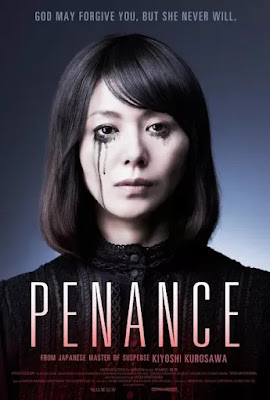Asako Adachi is a mother worthy of Greek tragedy. When her daughter is murdered, she offers a grim choice to the girl’s four friends who saw, but could not identify her killer. Either spend their lives hunting for the murderer, or eventually accept a karmic retribution that she approves of. That is pretty heavy for elementary school students, so it is hardly shocking they all turn out to be emotionally damaged fifteen years later in Japanese auteur Kiyoshi Kurosawa’s five-episode Penance, which premieres today on OVID.tv.
For some reason, the killer deliberately chose Emili from her group of friends, when he approached them on a pretext. They all had a perfect view of him, yet they all insist they cannot remember his face. Fifteen years later, their bill of penance starts to come due, but it is not necessarily Adachi who will collect. Somehow fate, karma, circumstances, and their own bad choices and character flaws will precipitate crises for all four survivors. Although they each have very different personalities and perspectives on that fateful day, they all contact Adachi as they find themselves facing personal disaster.
In some ways, shy Sae Kikuchi never fully matured, so she married a profoundly flawed control-freak husband. Maki Shinohara became a strict martinet high school teacher, who feels compelled to enforce rules without exception. Akiko Takano is a borderline hikikomori with family issues that are about to get much worse. Likewise, Yuka Ogawa has an extreme case of sibling rivalry, as well as a weird cop fetish, born out of that horrific experience.
What really makes Penance so intriguing is Kyoko Koizumi’s haunting performance as Adachi. Instead of a ruthless Medea-like vengeful mother, she is not without sympathy for the four young women. In fact, she even offers them help, at times. Yet, her eyes are always obsessively on the prize of just payback. As a result, Koizumi’s work as Adachi is cool and detached, but weirdly easy to identify with and root for.
Yu Aoi, Eiko Koike, Sakura Ando and Chizuru Ikewaki all create radically different personas as the four grown women, but they are all fully developed, with no shortage of flaws and weaknesses. Together, they demonstrate the perverse and lingering effects of trauma. Shinohara’s story is possibly the richest, because it clearly offers extensive commentaries on the compulsive face-saving and CYA-ing of the Japanese educational system, which in turn is a proxy for society at large. Takano’s is probably the weakest, because it is pretty easy to predict where it goes.













